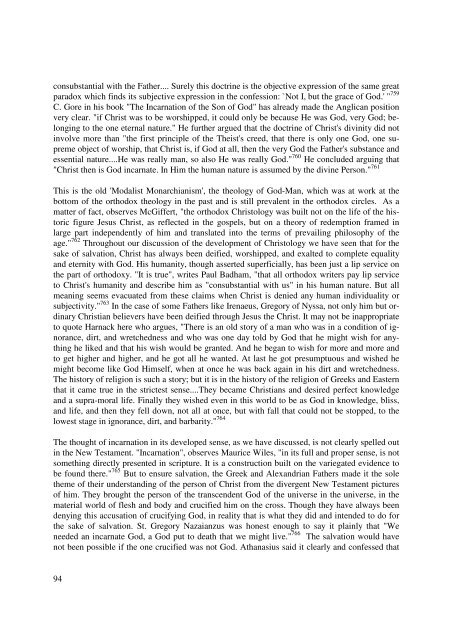Scripture and God in Christianity
Scripture and God in Christianity
Scripture and God in Christianity
You also want an ePaper? Increase the reach of your titles
YUMPU automatically turns print PDFs into web optimized ePapers that Google loves.
consubstantial with the Father.... Surely this doctr<strong>in</strong>e is the objective expression of the same great<br />
paradox which f<strong>in</strong>ds its subjective expression <strong>in</strong> the confession: `Not I, but the grace of <strong>God</strong>.' " 759<br />
C. Gore <strong>in</strong> his book "The Incarnation of the Son of <strong>God</strong>" has already made the Anglican position<br />
very clear. "if Christ was to be worshipped, it could only be because He was <strong>God</strong>, very <strong>God</strong>; belong<strong>in</strong>g<br />
to the one eternal nature." He further argued that the doctr<strong>in</strong>e of Christ's div<strong>in</strong>ity did not<br />
<strong>in</strong>volve more than "the first pr<strong>in</strong>ciple of the Theist's creed, that there is only one <strong>God</strong>, one supreme<br />
object of worship, that Christ is, if <strong>God</strong> at all, then the very <strong>God</strong> the Father's substance <strong>and</strong><br />
essential nature....He was really man, so also He was really <strong>God</strong>." 760 He concluded argu<strong>in</strong>g that<br />
"Christ then is <strong>God</strong> <strong>in</strong>carnate. In Him the human nature is assumed by the div<strong>in</strong>e Person." 761<br />
This is the old 'Modalist Monarchianism', the theology of <strong>God</strong>-Man, which was at work at the<br />
bottom of the orthodox theology <strong>in</strong> the past <strong>and</strong> is still prevalent <strong>in</strong> the orthodox circles. As a<br />
matter of fact, observes McGiffert, "the orthodox Christology was built not on the life of the historic<br />
figure Jesus Christ, as reflected <strong>in</strong> the gospels, but on a theory of redemption framed <strong>in</strong><br />
large part <strong>in</strong>dependently of him <strong>and</strong> translated <strong>in</strong>to the terms of prevail<strong>in</strong>g philosophy of the<br />
age." 762 Throughout our discussion of the development of Christology we have seen that for the<br />
sake of salvation, Christ has always been deified, worshipped, <strong>and</strong> exalted to complete equality<br />
<strong>and</strong> eternity with <strong>God</strong>. His humanity, though asserted superficially, has been just a lip service on<br />
the part of orthodoxy. "It is true", writes Paul Badham, "that all orthodox writers pay lip service<br />
to Christ's humanity <strong>and</strong> describe him as "consubstantial with us" <strong>in</strong> his human nature. But all<br />
mean<strong>in</strong>g seems evacuated from these claims when Christ is denied any human <strong>in</strong>dividuality or<br />
subjectivity." 763 In the case of some Fathers like Irenaeus, Gregory of Nyssa, not only him but ord<strong>in</strong>ary<br />
Christian believers have been deified through Jesus the Christ. It may not be <strong>in</strong>appropriate<br />
to quote Harnack here who argues, "There is an old story of a man who was <strong>in</strong> a condition of ignorance,<br />
dirt, <strong>and</strong> wretchedness <strong>and</strong> who was one day told by <strong>God</strong> that he might wish for anyth<strong>in</strong>g<br />
he liked <strong>and</strong> that his wish would be granted. And he began to wish for more <strong>and</strong> more <strong>and</strong><br />
to get higher <strong>and</strong> higher, <strong>and</strong> he got all he wanted. At last he got presumptuous <strong>and</strong> wished he<br />
might become like <strong>God</strong> Himself, when at once he was back aga<strong>in</strong> <strong>in</strong> his dirt <strong>and</strong> wretchedness.<br />
The history of religion is such a story; but it is <strong>in</strong> the history of the religion of Greeks <strong>and</strong> Eastern<br />
that it came true <strong>in</strong> the strictest sense....They became Christians <strong>and</strong> desired perfect knowledge<br />
<strong>and</strong> a supra-moral life. F<strong>in</strong>ally they wished even <strong>in</strong> this world to be as <strong>God</strong> <strong>in</strong> knowledge, bliss,<br />
<strong>and</strong> life, <strong>and</strong> then they fell down, not all at once, but with fall that could not be stopped, to the<br />
lowest stage <strong>in</strong> ignorance, dirt, <strong>and</strong> barbarity." 764<br />
The thought of <strong>in</strong>carnation <strong>in</strong> its developed sense, as we have discussed, is not clearly spelled out<br />
<strong>in</strong> the New Testament. "Incarnation", observes Maurice Wiles, "<strong>in</strong> its full <strong>and</strong> proper sense, is not<br />
someth<strong>in</strong>g directly presented <strong>in</strong> scripture. It is a construction built on the variegated evidence to<br />
be found there." 765 But to ensure salvation, the Greek <strong>and</strong> Alex<strong>and</strong>rian Fathers made it the sole<br />
theme of their underst<strong>and</strong><strong>in</strong>g of the person of Christ from the divergent New Testament pictures<br />
of him. They brought the person of the transcendent <strong>God</strong> of the universe <strong>in</strong> the universe, <strong>in</strong> the<br />
material world of flesh <strong>and</strong> body <strong>and</strong> crucified him on the cross. Though they have always been<br />
deny<strong>in</strong>g this accusation of crucify<strong>in</strong>g <strong>God</strong>, <strong>in</strong> reality that is what they did <strong>and</strong> <strong>in</strong>tended to do for<br />
the sake of salvation. St. Gregory Nazaianzus was honest enough to say it pla<strong>in</strong>ly that "We<br />
needed an <strong>in</strong>carnate <strong>God</strong>, a <strong>God</strong> put to death that we might live." 766 The salvation would have<br />
not been possible if the one crucified was not <strong>God</strong>. Athanasius said it clearly <strong>and</strong> confessed that<br />
94
















